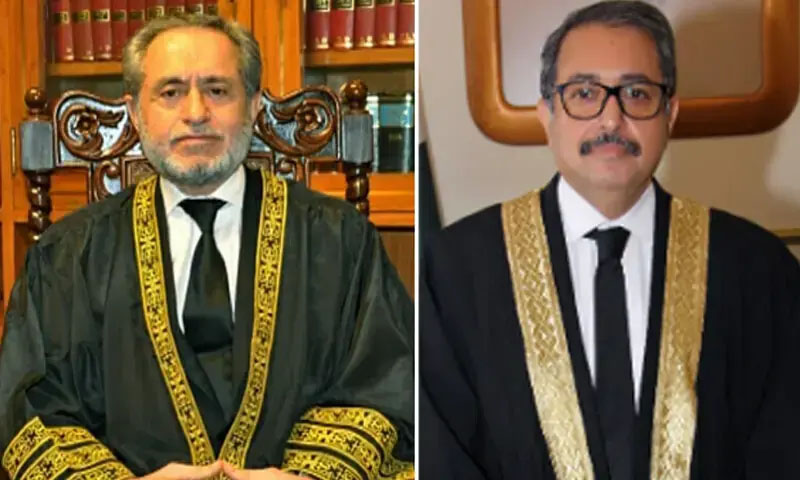- Web Desk
- 3 Hours ago
Three key constitutional and judicial bodies formed after 27th Amendment
-

- Web Desk
- Nov 18, 2025

ISLAMABAD: Three key constitutional and judicial bodies have been reconstituted after the enactment of the 27th Constitutional Amendment.
Under these changes, Supreme Court Judge Justice Jamal Khan Mandokhail has been appointed as a member of the Supreme Judicial Council (SJC) and the Practice and Procedure Committee, while Federal Constitutional Court (FCC) Judge Justice Aamer Farooq has been included in the Judicial Commission of Pakistan (JCP).
Among these three major legal bodies, the Supreme Judicial Council will be the highest forum for the accountability of judges, the Practice and Procedure Committee will be responsible for forming benches and fixing cases, while the Judicial Commission of Pakistan will appoint judges to the superior judiciary.
Their reconstitution was required under the 27th Constitutional Amendment.
According to a press release issued by the Supreme Court, the bodies have been restructured under the new constitutional framework.
The press release said that the second senior-most judge of the Supreme Court, Justice Jamal Mandokhail, was jointly nominated by Chief Justice of Pakistan Yahya Afridi and Federal Constitutional Court Chief Justice Aminuddin Khan as a member of the Supreme Judicial Council.
The new members of the Supreme Judicial Council include the Chief Justice of Pakistan, FCC Chief Justice Aminuddin Khan, Justice Munib Akhtar, Justice Hasan Azhar Rizvi, Lahore High Court Chief Justice Aalia Neelum, Islamabad High Court Chief Justice Sarfraz Dogar, and Justice Jamal Mandokhail.
According to the amendment, the Supreme Judicial Council will be headed by the senior-most judge among either the Chief Justice of Pakistan or the FCC chief justice — which means Chief Justice Yahya Afridi will remain its head.
Justice Jamal Mandokhail has also been included to the Practice and Procedure Committee, which will now comprise the chief justice, Justice Munib Akhtar and Justice Jamal Mandokhail.
Similarly, FCC’s second senior-most judge, Justice Aamer Farooq, has been jointly nominated by the Chief Justice of Pakistan and the FCC chief justice as a member of the Judicial Commission of Pakistan.
The Judicial Commission of Pakistan will now include Chief Justice of Pakistan Justice Yahya Afridi, FCC Chief Justice Aminuddin Khan, Justice Munib Akhtar, Justice Hasan Azhar Rizvi, Justice Aamer Farooq, the Attorney General, the Federal Law Minister, Pakistan Bar Council representative Ahsan Bhoon, two members of the National Assembly, two senators, and one woman or non-Muslim member (to be nominated by the National Assembly speaker).
According to the press release, these institutions will continue to perform their functions in accountability, judicial appointments, and administrative matters under the new constitutional structure.
These changes come against the backdrop of the sweeping reorganisation of the judicial framework under the 27th Constitutional Amendment, which created the Federal Constitutional Court — a move criticised by the opposition and several legal experts.
Immediately after the amendment came into effect, two Supreme Court judges, Justice Athar Minallah and Justice Mansoor Ali Shah, resigned from office.
ICJ expresses concerns
Meanwhile, the International Commission of Jurists (ICJ), an international legal organisation, has raised concerns over the 27th Constitutinal Amendment — particularly with regard to the establishment of the Federal Constitutional Court, the appointment of judges, the new structure of the Judicial Commission of Pakistan, the transfer of high court judges, and the immunity granted to the President and military leadership.
According to the ICJ, after this amendment, the Supreme Court will primarily remain an appellate forum, while the authority for constitutional interpretation will shift to the Federal Constitutional Court.
The ICJ further said the first judge of the FCC will be appointed by the president on the advice of the prime minister, while future appointments will be made on the recommendation of the Judicial Commission of Pakistan — but the amendment does not clearly define the criteria or principles for these appointments.




